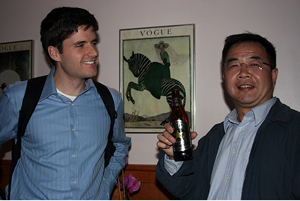Sunny Yang, a recent immigrant from South Korea, studies English at a school in Manhattan, but finds that the best way to improve her language skills is to interact with native speakers. So she uses Meetup.com, a popular social networking site, to meet English speakers. In exchange for helping her to learn English, she offers to teach them to speak Korean.
For some immigrants, social networking has become not just a means of sharing photographs or staying in touch with old friends but a valuable tool for assimilation. Sites like Meetup.com and Facebook help immigrants to establish themselves in America by connecting with others who speak the same language and face similar challenges.
In an e-mail, Yang, 25, wrote that even though she and other immigrants could meet people the old fashioned way — at clubs, parties, bars and other social events — recent immigrants often feel marginalized by differences in language and customs.
“For us, the foreign students who don’t know American culture and people, it is not that easy to go in any bars or clubs and get along with them,” she wrote. “On the other hand, the Internet is easy to access and you can even say hello to anyone, anytime, anywhere. There is no one who is staring at you when you make mistakes because of your language or culture difference.”
Net Effect For Asians
Traditionally, Asian immigrants in New York — and particularly Queens, which has the largest Asian population of all the boroughs — have connected to other immigrants, improved their English or integrated into American society through the community and public institutions.
“When there was no Internet,” Yang wrote, “the only way to meet people and make friends in the foreign country was just being introduced a friend of friend, going to church or attending school.”
But now Chinese and Korean immigrants in Queens, are increasingly using social networking websites to meet people and make friends.
Yang could do that without the Internet, she admits.
“For foreigners like me, it is way more difficult and something we need big courage to do,” she wrote. “Or maybe I am too shy?”
Facebook Fans
Yang belongs to The New York City Korean Language group on Meetup, which boasts 651 members. Several Facebook groups dedicated to immigrant groups each claim more than 100 users.
Andrew Dong Hyuk Hahm, 19, started a Facebook group that connects 114 users interested in the Korean-American Presbyterian Church of Queens — it’s called “I went to KAPCQ yea yeah.” Based in Flushing, the church is more than 35 years old and has a weekly attendance of between 2,000 and 3,000 congregants, most of whom are immigrants. The Facebook group allows former church members to stay in touch.
“A group like the one I created connects people,” Hahm wrote in an on-line interview conducted through Facebook. As an example he cited an uncle who, having attended KAPCQ in the early 1990’s, recently opened a Facebook account and joined Hahm’s group. Now, the two keep in close contact.
But not every Facebook group has worked out as its founders wanted.
A little more than a year ago, Linny Fang, who moved to Flushing from Taiwan in 1990 when she was eight, created “Chinese in Queens NYC,” a group on Facebook with 153 members.
“I had many plans in mind for the group when it was first established,” Fang wrote in a Facebook message. She had hoped, for instance, to post frequent updates about community events so that the members of the group could meet.
But the group hasn’t succeeded as Fang had hoped.
“It is a big effort to try to maintain the ideal group,” she wrote. “Unfortunately, and I am mildly ashamed, I haven’t been doing my part to really actualize my plans and thoughts.”
Common Goals
Other Internet-based social groups have had more success. For three years, Al Jeannot, 54, a paralegal and trained linguist, has organized language groups through Meetup.com, which allows users to join groups with the purpose of sharing a common goal — in this case, learning and preserving an immigrant’s language.
“In New York, (immigrants) are isolated and often room with people whom they have no affinity with, so they go to the Internet to find their own kind,” he said on a recent afternoon at the Brooklyn Botanic Garden, where about 10 members of the Meetup group he founded, “Chinese Chat,” met. Based in Flushing, the group’s members primarily live there and in neighboring Bayside.
Jeannot, who moved to New York from Haiti in the 1970s, speaks seven languages: Haitian Creole, Spanish, German, Japanese, Italian, French and English. Next up? Perfecting his Mandarin.
“The best way to learn a language is to meet up with people and speak to them,” he said.
No one knows that better than Sunny Yang, who considers the social networking she does on Meetup.com to be indispensable to her assimilation into American culture.
“I can’t even imagine my New York life without the Internet,” she wrote.
(To read an interview with Dr. Julia B. Carroll, deputy chairwoman of the Basic Educational Skills program at Queensborough Community College in Queens, click here.)

